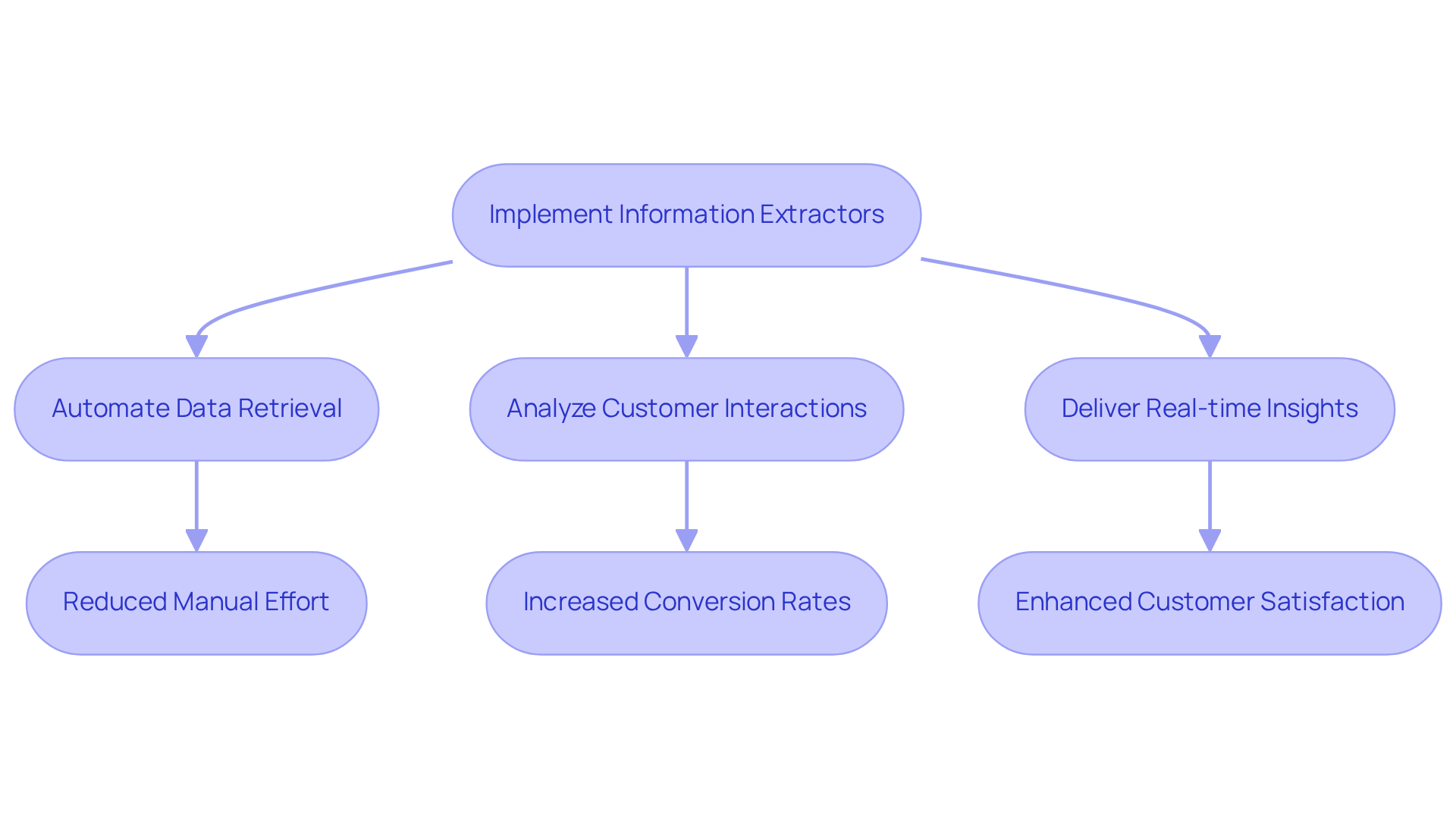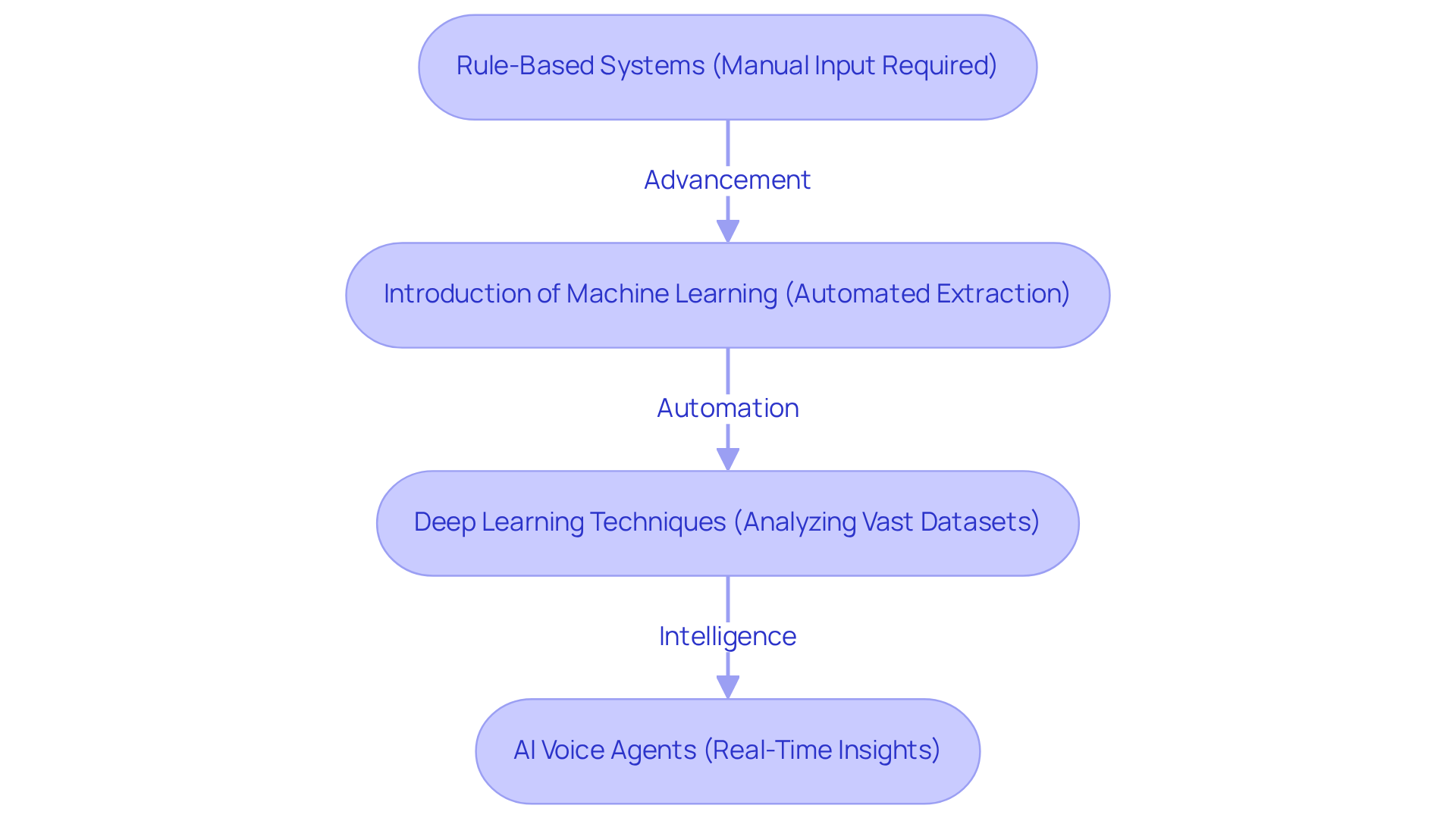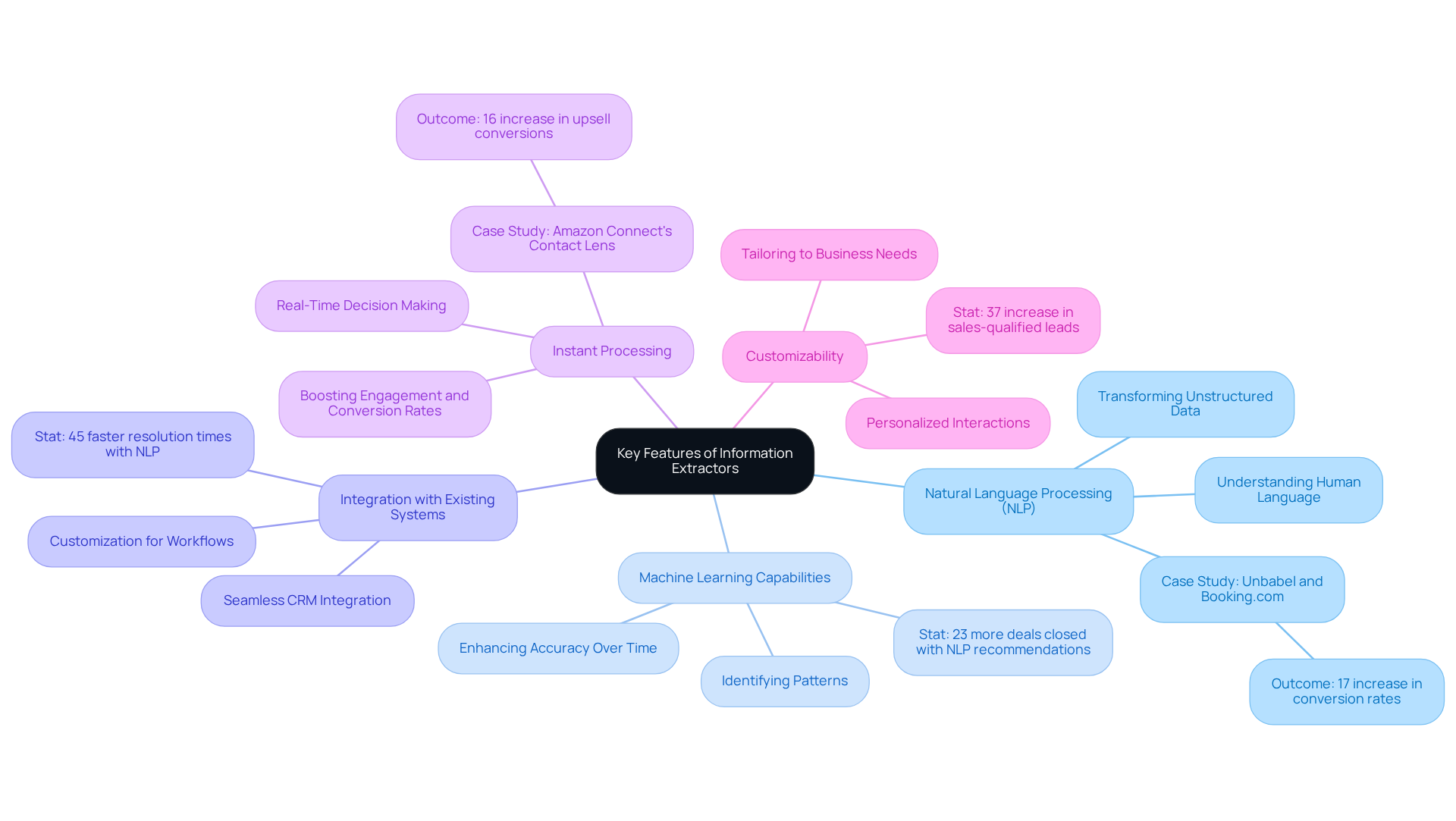Overview
An information extractor is a powerful software tool that automates the identification and retrieval of relevant data from unstructured sources. This tool plays a vital role in enhancing sales efficiency and decision-making. By streamlining data collection and analysis, businesses can significantly improve lead management and conversion rates. This ultimately drives revenue growth and operational effectiveness.
Consider the impact: organizations that leverage information extractors can transform their data handling processes. For instance, companies that have implemented these tools report a marked increase in their ability to convert leads into sales. This not only boosts revenue but also enhances overall operational efficiency.
In conclusion, adopting an information extractor is not just a technological upgrade; it’s a strategic move that can lead to substantial business growth. By embracing this tool, businesses position themselves to thrive in a competitive landscape, ensuring they make informed decisions that propel them forward.
Introduction
In today's data-driven sales landscape, an information extractor stands as a vital tool for organizations. It enables them to efficiently sift through vast amounts of unstructured data, transforming it into actionable insights. By automating the retrieval of essential information, sales teams can enhance their strategies, streamline lead management, and ultimately drive revenue growth.
However, as companies increasingly rely on these advanced technologies, one must consider: what challenges do they face in effectively harnessing the power of information extraction to optimize their sales processes? This question not only highlights the potential of these tools but also invites a deeper exploration into the complexities of their implementation.
Define Information Extractor: Core Concepts and Functionality
An information extractor is a sophisticated software tool or algorithm that is designed to automatically identify and retrieve specific elements from unstructured or semi-structured sources, including text documents, emails, and web pages. Its primary function involves utilizing an information extractor to analyze vast amounts of information in order to pinpoint relevant entities, relationships, and events, transforming them into a structured format that facilitates straightforward analysis and application. This capability is crucial in commerce, where timely and accurate data retrieval can significantly enhance decision-making and operational efficiency.
For instance, companies leveraging data retrieval technologies can streamline their lead management processes, converting chaotic data into actionable insights that drive revenue growth. By automating the extraction of vital information, organizations can improve their response times to leads, ultimately increasing conversion rates and refining their sales strategies. Notably, statistics reveal that 95% of leads never convert into customers, underscoring the critical need for effective data retrieval to boost conversion rates.
Moreover, as one expert aptly stated, "It is feasible to convert many more quotes into sales without reducing prices," highlighting how effective data gathering can enhance sales tactics without compromising pricing strategies. Additionally, case studies from sectors such as healthcare and finance demonstrate the practical applications of knowledge retrieval, showcasing its ability to manage large volumes of unstructured content and improve operational outcomes.
However, challenges remain, particularly in managing extensive amounts of unstructured data, necessitating robust strategies to ensure the efficiency of extraction systems. Addressing these challenges is essential for organizations aiming to harness the full potential of data retrieval technologies.

Contextualize the Role of Information Extractors in Sales Optimization
In the sales environment, the information extractor plays a crucial role in boosting efficiency and effectiveness. By automating the retrieval of essential data—like customer profiles, lead qualifications, and transaction histories—sales teams can focus their efforts on high-value activities rather than tedious manual data entry. For example, a data extractor can analyze customer emails to pinpoint product inquiries, automatically classifying and prioritizing them for swift follow-up. This capability not only accelerates response times but also equips representatives with the most relevant information, leading to improved conversion rates and heightened customer satisfaction.
Companies that embrace this technology often see significant reductions in operational costs while gaining a competitive edge in their markets. The integration of automated data extraction tools, such as those provided by Intone, has been shown to enhance engagement rates, with businesses reporting up to 90% less manual effort required. This allows teams to concentrate on nurturing relationships and closing deals.
Moreover, Intone's AI voice agents deliver real-time insights and automated quality assurance, enabling organizations to monitor changes in key metrics and continuously refine their sales strategies. As a result, organizations can streamline their selling processes by utilizing an information extractor, ensuring a steady flow of qualified leads and maximizing revenue potential.
According to a case study titled 'Transforming Sales Funnels with Advanced Lead Gathering,' companies have significantly improved their revenue pathways and conversion rates by leveraging advanced lead gathering tools. As Jack Smith aptly noted, "Small improvements in efficiency can translate into massive gains in conversions." This underscores the profound impact that automation and data enrichment, particularly through Intone's AI voice agents, can have on sales efficiency and overall performance.

Trace the Evolution of Information Extraction Technologies
The evolution of data retrieval technologies has been significantly influenced by advancements in natural language processing (NLP) and machine learning. Initially, these technologies depended on rule-based systems, which required extensive manual input to define extraction criteria. However, the advent of machine learning algorithms has ushered in a more automated and intelligent approach.
Modern information extractors leverage deep learning techniques to analyze vast datasets, enabling them to learn from patterns and enhance their accuracy over time. This transformation empowers businesses to manage unstructured information at scale, fundamentally reshaping their management and decision-making processes.
Consider Intone's AI voice agents. Organizations can monitor calls and enhance revenue in real time, gaining actionable insights that lead to improved customer interactions. Notably, Intone's technology boosts conversion rates—reportedly achieving 1.5 times more conversions than human agents—while also enhancing operational efficiency by managing high call volumes without the need for additional staff.
As companies increasingly adopt these sophisticated AI tools, they gain a competitive edge by utilizing an information extractor to harness the potential of information to drive revenue performance. Embracing these advancements is not just an option; it’s a strategic imperative for businesses aiming to thrive in today’s data-driven landscape.

Identify Key Features and Characteristics of Information Extractors
Key features of effective information extractors are crucial for businesses aiming to refine their marketing strategies:
-
Natural Language Processing (NLP): This technology empowers tools to comprehend and interpret human language, ensuring accurate extraction of pertinent information. NLP is essential for transforming unstructured data into actionable insights, particularly in commercial settings where understanding customer intent is vital.
-
Machine Learning Capabilities: Machine learning capabilities enable information extractors to identify patterns in data, thereby enhancing accuracy and efficiency over time. This adaptability enables companies to refine their marketing strategies in response to evolving customer behaviors and preferences.
-
Integration with Existing Systems: Seamless integration with CRM and other sales tools is imperative. Intone's AI voice agents can be customized to fit existing workflows, facilitating smoother operations and improved information management. Companies that have successfully integrated NLP-driven information extractors into their CRM systems report significant enhancements in lead qualification and customer engagement.
-
Instant Processing: The ability to process information in real-time is essential for prompt decision-making and responsiveness in commercial environments. This feature allows teams to act swiftly on insights, boosting engagement and conversion rates.
-
Customizability: Organizations must have the flexibility to tailor the extractor to their specific business needs. Intone's AI agents enable companies to personalize interactions, configure information sources, and establish call transfer guidelines, ensuring alignment with unique commercial processes and enhancing overall tool efficiency.
Together, these features significantly enhance the capability of the information extractor, making it indispensable for businesses seeking to optimize their marketing approaches. A notable example is the partnership between Unbabel and Booking.com, which illustrates the practical benefits of NLP, resulting in a 17% increase in conversion rates on localized landing pages. Furthermore, it is crucial to consider the legal and ethical implications of using NLP in sales, particularly concerning data privacy and compliance with regulations like GDPR and CCPA. These considerations are vital for businesses aiming to implement NLP technologies responsibly.

Conclusion
An information extractor stands as a transformative tool, playing a pivotal role in modern sales strategies by automating the retrieval of critical data from unstructured sources. This technology converts chaotic information into structured insights, empowering sales teams to operate more efficiently and make informed decisions that drive revenue growth. The significance of this technology is immense, as it directly influences the effectiveness of sales processes and enhances overall performance.
Key arguments throughout the article highlight the various functionalities of information extractors. These include:
- Their ability to streamline lead management
- Improve response times
- Reduce operational costs
The evolution of these technologies, particularly through advancements in natural language processing and machine learning, has further augmented their effectiveness. Companies that have embraced these tools, such as Intone's AI voice agents, have reported substantial increases in conversion rates and customer satisfaction. This showcases the profound impact of automation on sales efficiency.
In conclusion, adopting information extractors is not merely a technological upgrade; it is a strategic necessity for businesses aiming to thrive in a data-driven landscape. Organizations must recognize the importance of leveraging these tools to enhance their sales strategies and optimize performance. As the landscape continues to evolve, embracing information extraction technologies will be crucial for those looking to stay competitive and maximize their revenue potential.
Frequently Asked Questions
What is an information extractor?
An information extractor is a software tool or algorithm designed to automatically identify and retrieve specific elements from unstructured or semi-structured sources, such as text documents, emails, and web pages.
What is the primary function of an information extractor?
The primary function of an information extractor is to analyze large amounts of information to pinpoint relevant entities, relationships, and events, transforming them into a structured format for easier analysis and application.
How does information extraction benefit businesses?
Information extraction enhances decision-making and operational efficiency by providing timely and accurate data retrieval, allowing companies to streamline processes like lead management and convert chaotic data into actionable insights that drive revenue growth.
What statistics highlight the importance of effective data retrieval in sales?
Statistics indicate that 95% of leads never convert into customers, emphasizing the critical need for effective data retrieval to improve conversion rates.
Can effective data gathering improve sales tactics without reducing prices?
Yes, effective data gathering can enhance sales tactics without compromising pricing strategies, as noted by an expert who stated, "It is feasible to convert many more quotes into sales without reducing prices."
What industries have demonstrated practical applications of knowledge retrieval?
Case studies from sectors such as healthcare and finance have shown the practical applications of knowledge retrieval, particularly in managing large volumes of unstructured content and improving operational outcomes.
What challenges do organizations face in information extraction?
Organizations face challenges in managing extensive amounts of unstructured data, which necessitates robust strategies to ensure the efficiency of extraction systems. Addressing these challenges is essential for harnessing the full potential of data retrieval technologies.






